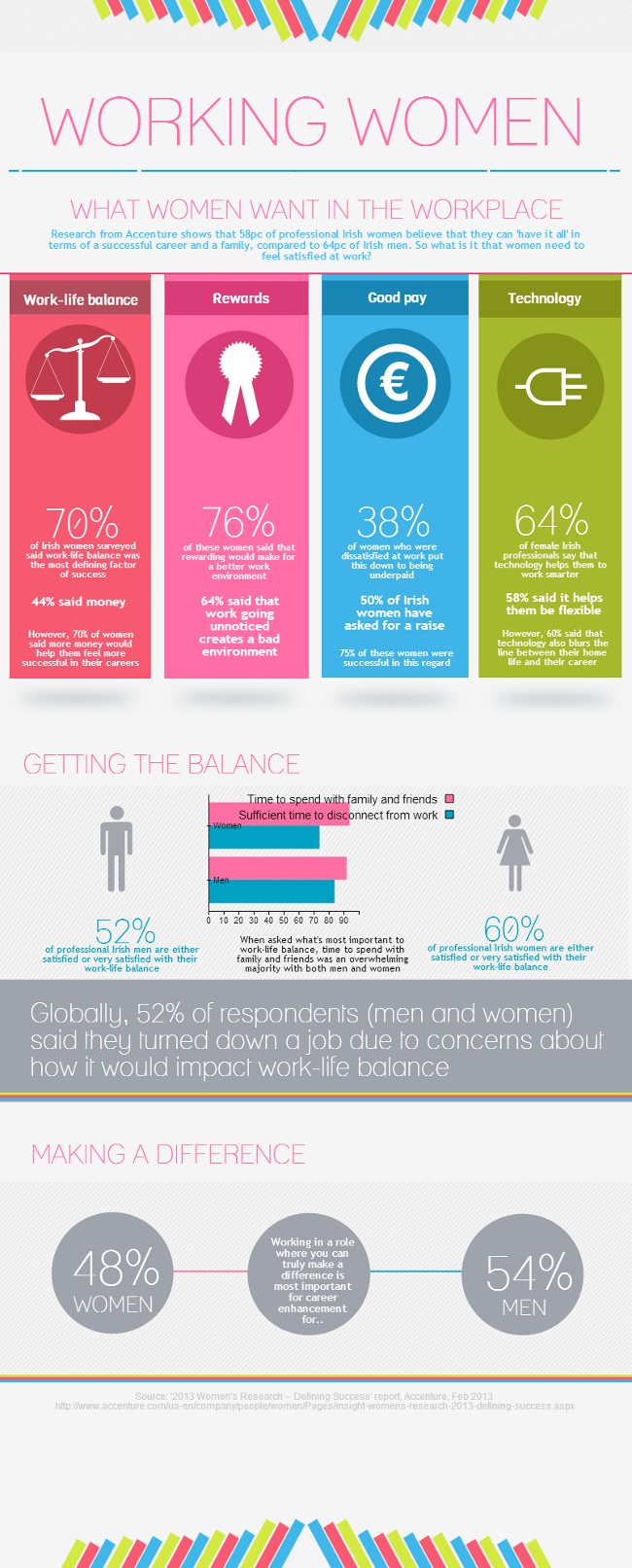Research from Accenture released ahead of International Women’s Day (8 March) reveals what professional Irish women want to feel successful at work. Greater work-life balance takes the lead over financial gains, with many people (men and women) turning down roles when this could be negatively impacted.
In the report Defining Success, Accenture presents figures from a survey conducted online in November 2012. The survey reached 4,100 business executives from medium to large-sized organisations in 33 countries, including Ireland, with a minimum of 100 respondents from each country.
Among the Irish respondents, most professionals – 58pc of women and 64pc of men – believe they can ‘have it all’ in terms of a successful career and family. However, globally, 50pc believe you can have it all, but not at the same time.
Getting the balance right
Achieving a good work-life balance is the challenge of a modern workplace, and the importance of getting it right is highlighted in this report. While 44pc of professional Irish women consider money to define success, 70pc say it’s work-life balance. Among men, 64pc equally saw money and work-life balance as definitive of success.
While 60pc of women and 52pc of men are satisfied or very satisfied with their work-life balance, a promotion or career advancement might be passed up if this balance were to be lost. Globally, 52pc of respondents (both men and women) said they had turned down a job due to concerns about its impact on work-life balance.
“Over the course of their careers, professionals will continue to define and redefine what success looks like,” said Paula Neary, a managing director for health and public service at Accenture Ireland. “For many, career goals and personal priorities will take precedence at different times. As today’s professionals strive to find the right balance, leading companies will find innovative ways to help them develop, grow and thrive.”
Technology can help in this respect, with 64pc of women and 78pc of men saying it enables them to work smarter. However, employers and employees need to be careful not to let this blur the line between work and personal life, with 60pc of women and 72pc of men seeing this as an issue.

Feeling underpaid and undervalued
That said, money is still important, with 70pc of Irish women saying that more money would make them feel more successful in their careers – and 50pc have asked for or negotiated a pay rise. Of these women, 75pc were successful in their endeavour, almost on a par with their male counterparts at 80pc.
These statistics will be encouraging for those who are currently dissatisfied at work, as the main reason for dissatisfaction among women was feeling underpaid (38pc).
Ensuring employees feel valued is important, particularly in the case of women, as 76pc of women compared to 56pc of men say that rewarding good work is the best way to foster a happy work environment. Feeling that their work goes unnoticed is the biggest contributor to a negative work environment for 64pc of women.
Another way to encourage employees to further their careers is to offer roles that truly make a difference, as 48pc of women and 54pc of men said this was the most important factor for career enhancement.
Main career balance image via Shutterstock
On International Women’s Day, 8 March, Silicon Republic launches Women Invent Tomorrow, a year-long campaign to champion the role of women in science, technology, engineering and maths. Watch this space!




